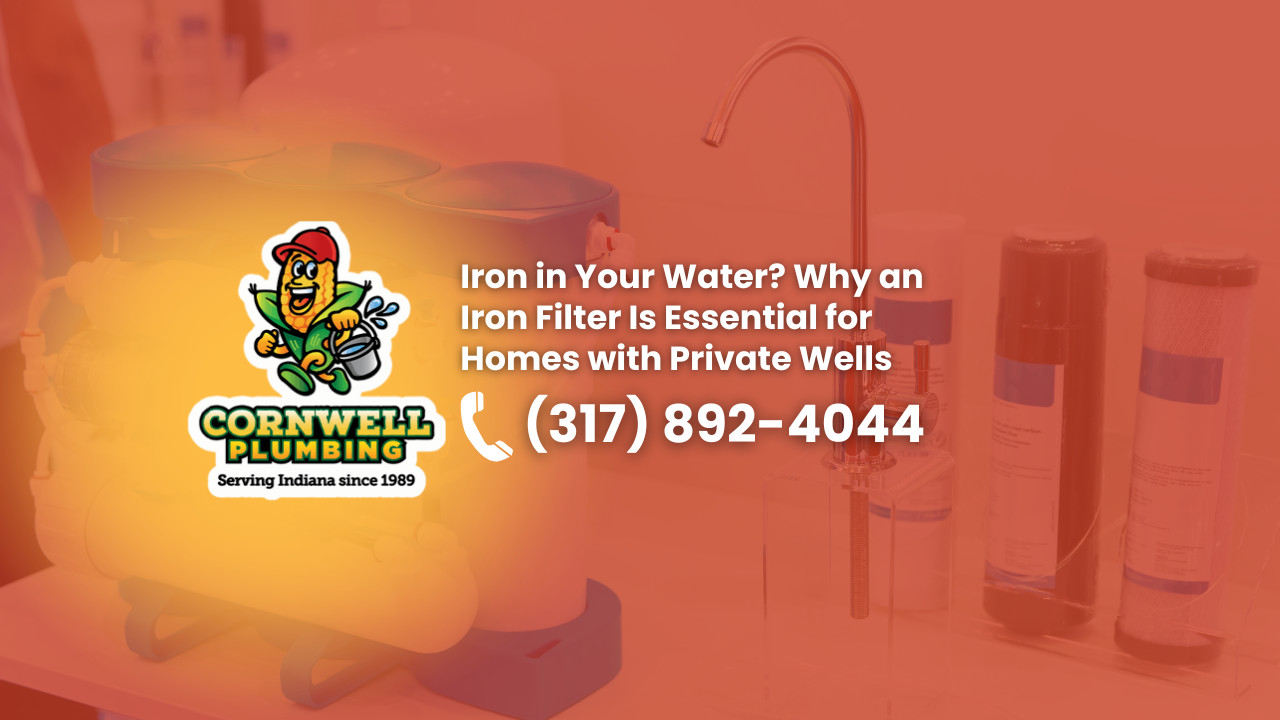
If you own a private well, you already know the perks. No water bill. Full control over your supply. And usually, clean, mineral-rich water straight from the ground. But wells come with their own set of challenges, especially when it comes to water quality.
Iron is one of the most common culprits. While it’s a natural part of the soil, too much iron in your water can create a long list of problems for your home. From stained toilets to damaged appliances and even potential health risks, iron buildup shouldn’t be ignored.
Let’s take a closer look at what iron does and how an iron filter can stop it in its tracks.
Stained Sinks, Tubs, and Toilets That Never Stay Clean
Tired of scrubbing those orange stains sticking to your fixtures and surfaces every week? That rust colored mess in your sink, tub, or toilet bowl is iron. It doesn’t matter how strong your cleaner is; it always comes back. Iron in well water sticks to porcelain and metal. Once it dries, it leaves behind a rusty layer that’s nearly impossible to get rid of.
This isn’t just ugly. It can make your home feel dirty even when it’s spotless. Over time, it can even damage fixtures and leave permanent marks.
An iron filter takes out the problem at the source. Instead of treating the stain, it removes the iron before it gets to your plumbing. No more guessing games with cleaners. No more wasting time scrubbing what won’t come off. With an iron filter in place, your bathroom and kitchen stay cleaner for longer without extra work. That means less cleaning and more peace of mind.
Clogged Pipes and Damaged Appliances
Iron doesn’t just stain, it builds up inside your plumbing, too. Over time, it forms a thick, rust-like crust that chokes your pipes and lowers your water pressure. If your shower feels weaker than usual or your faucet spits instead of flows, iron buildup might be to blame.
Washing machines, dishwashers, and water heaters also suffer. Iron damages the inner parts, lowers efficiency, and shortens their life. That means more breakdowns, more service calls, and more money down the drain.
Installing an iron filter stops that cycle. It pulls the iron out of the water before it reaches your appliances. No more rust lining your pipes. No more extra wear and tear on expensive equipment.
You get better pressure, cleaner water, and fewer repairs. That’s not just a comfort upgrade, it’s real savings. When appliances last longer and plumbing stays clear, your whole home runs smoother.
Ruined Laundry and Discolored Clothing
Ever pull clean clothes from the washer and find them looking worse than before? That yellowish tint or reddish blotch on your favorite shirt probably came from iron. Even low levels of iron in water can cause laundry disasters.
White clothes turn dull. Colors fade faster. Towels feel stiff instead of soft. And don’t even try to bleach the stains—iron reacts with bleach and can make it worse.
An iron filter helps protect your clothes from this mess. By filtering the iron out of your water, you prevent those unwanted stains from ever touching your laundry. Clothes stay bright, soft, and actually clean.
It also helps your washing machine stay in better shape. Iron can clog and corrode internal parts, leading to early breakdowns. A filter keeps your washer running right while keeping your clothes safe. Say goodbye to ruined laundry and hello to fresh, spotless loads again.
Slippery, Irritating Water That Affects Skin and Hair
Iron-rich water feels different on your skin. Many homeowners describe it as slimy or slick, even after rinsing for a while. That’s because iron interacts with soaps and shampoos, making it harder to wash off. You end up using more soap but still don’t feel clean.
And it does more than just feel weird. It can dry out your skin, irritate sensitive areas, and leave your hair dull or brittle. Iron residue builds up on your scalp, too, making it harder to manage your hair.
An iron filter fixes this right away. Once the iron is removed, soap works like it’s supposed to. You rinse off clean. Your skin feels normal. Your hair looks healthier and smoother.
For families dealing with dry skin or itchy scalps, switching to filtered water can make a huge difference. It’s not just a luxury, it’s part of staying comfortable and healthy every day.
Hidden Health and Bacterial Risks in Your Water
Iron by itself isn’t toxic. But when iron levels get too high, they can open the door to other problems. For one, iron bacteria thrive in that environment. These bacteria form slimy coatings in your pipes and well equipment. That slime traps dirt and can breed harmful microorganisms like coliform bacteria.
Once that happens, your water is no longer safe to drink. It could carry germs that make your family sick. Even if it doesn’t taste bad yet, it might already be unsafe.
An iron filter keeps these risks out of your home. It removes the iron before it feeds bacteria and creates bigger issues. Some filters are even designed to handle bacterial growth directly, depending on the system you choose.
So, when you install a filter, you’re doing more than improving your water; you’re protecting your family’s health. Clean water should be more than just clear; it should be safe, too.
Keep Your Well Water Clear and Safe with Cornwell Well Pump and Water Solutions
Well water can be a great resource, but only when it’s properly managed. Don’t let iron ruin your plumbing, damage your appliances, or put your health at risk. At Cornwell Well Pump and Water Solutions, we specialize in testing, treating, and protecting well water systems across the region.
If you’re dealing with rust stains, odd smells, low pressure, or laundry troubles, it might be time for an iron filter. We’ll inspect your well, recommend the right system, and install it fast, so you can get back to enjoying truly clean water.
Call us today to schedule your water test and take the first step toward safer, iron-free water. Your home deserves nothing less!
Andrew and Austin Cornwell stepped into leadership, bringing with them not just their plumbing licenses and two decades of experience each, but a vision for even better customer service.
Emergency Plumbing?
Contact the plumber or plumbing company to schedule a service call. Be prepared to provide help about the problem.


